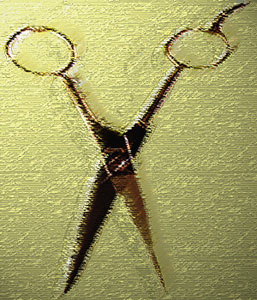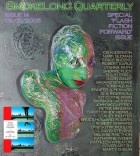We lie side-by-side holding hands in the darkness. Her father’s snoring loud from the lone bedroom a floor below. “You know, he never passed on his skill,” my wife says, the hard edges of her accent smoothed over after fifteen years in the States. “The Shanghai Cut.”
“The what?” I ask, opening my eyes. I lift up from the misshapen air mattress we’ve endured since her father’s visit.
“The Shanghai Cut.”
Then she explains. Her father, a retired barber from Taiwan, learned his trade as a young man in Shanghai, a city reputed to have the very best barbers in Asia. “Shanghai was known for three cuts,” she says, making three chopping motions with her right hand, her opaque skin slicing a light trail through the air. “Chef, tailor, and barber. You know—cut food, cut cloth, and cut hair.”
My nostrils flare and I sniff at imagined smells: stir-fried vegetables, treated leather, talcum powder.
“Cut and knife mean the same in Chinese,” my wife adds. “We say that scissors are like two knives together.”
The information grabs my attention, diverts my mind from anxious thoughts of the coming workday. “What’s the Shanghai Cut look like?” I ask.
“It’s very conservative,” she answers. “My father says you must be able to cut right down to the roots, so the hair will stay neat and in place—even in a typhoon.” She pauses, draws a breath, exhales. “But customers also get wash, massage, facial, shave, manicure, ear-cleaning. That’s part of it, too.”
I run a hand over my bristled scalp. A few days before I’d gone to a hair salon, a nationwide chain charging twenty-five bucks for a shampoo and cut. A girl in her early twenties with a tattooed neck finished my hair in five minutes, snapping her bubble gum the whole time while raking an electric razor over my head.
“I’d never leave your father’s chair,” I say.
“Oh, his customers loved him. He was famous in Taiwan because he had very important clients: celebrities, politicians, businessmen. They never went to any other barber but my father.”
I pull her hand close to my lips. Her fingertips still smell of fried fish and dish soap, a product of her dinner duties that night.
“He never passed it on, the Shanghai Cut?”
“No.”
“Why?”
“Because the style isn’t popular anymore. Young people don’t want to learn something only a few old people want. My father had to apprentice more than three years in Shanghai before he could start his business in Taiwan. Who has that much time and patience nowadays?”
Not me. I see myself each day at work, busy and distracted, flitting from one task to the next, unable to concentrate long enough to complete any of them.
“I wish he could speak English,” I say. “He could teach me.”
The snoring downstairs stops. Several hard coughs cut the silence. The soft creaking of floorboards ends with the gentle closing of the bathroom door.
“A Chinese doctor told him his prostrate is weak,” my wife whispers. “My father’s very worried about it.”
We hear the toilet flush, the sound of his feet padding back to bed. The snoring resumes after several minutes.
“I mean it,” I say. “I’d like to be a barber. Talking to people all day. Getting to know them while I cut their hair. Don’t you think it sounds nice?”
My wife doesn’t answer. Then I realize she’s also fallen asleep, puffing out faint breaths from her small lips.
I close my eyes and drift into fantasy. I imagine myself owning an old-fashioned barbershop, with gold-plated chairs and white porcelain sinks with smooth ivory handles. I see smoked-glass mirrors lining the walls, and a glistening parquet floor underfoot. A thick-glass parfait on a polished marble shelf holds a spray of black plastic combs drowning in green-dyed antiseptic. Next to is an opened teak carrying case, my scissors and razors, each shined and sharpened to perfection, gleaming atop the blue velvet lining.
As for me, I’m wearing a white cotton smock over a navy dress shirt, its starched collar noosed smartly by a silken tie. My slacks are pleated and made of gray flannel, the cuffs tapering gracefully into a pair of newly buffed, brown loafers. In my lapel sprouts a single red poppy, and my lone jewelry is a sparkling, silver-banded wristwatch that clinks and clacks as I snap a mahogany-handled whiskbroom across the already spotless floor. And when the first customer of the day comes through the door, a debonair looking gentleman in a somber three-piece suit with matching wingtips, I bow slightly and guide him to the chair with a confident hand, calmly awaiting his request for my unique specialty, the Shanghai Cut.



 The core workshop of SmokeLong Fitness is all in writing, so you can take part from anywhere at anytime. We are excited about creating a supportive, consistent and structured environment for flash writers to work on their craft in a community. We are thrilled and proud to say that our workshop participants have won, placed, or been listed in every major flash competition. Community works.
The core workshop of SmokeLong Fitness is all in writing, so you can take part from anywhere at anytime. We are excited about creating a supportive, consistent and structured environment for flash writers to work on their craft in a community. We are thrilled and proud to say that our workshop participants have won, placed, or been listed in every major flash competition. Community works.